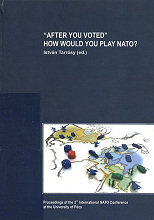
"After you voted" (előszó)
After the success of the first international NATO conference held in Pécs right before the national referendum on Hungary's membership took place in November 1997, the organisers were determined to continue the discussion in a few years. The second conference that we hosted between 11 and 13 March 2003 was connected with the fourth anniversary of the membership of the three former socialist countries, i.e. Poland, the Czech Republic and Hungary. Our aim was to offer a quality academic event providing the framework for analyses and discussions about the place and role of the Transatlantic alliance in the changing international security architecture. Among our definite objectives we defined the need for a better understanding of the challenges Hungary and other, old and new members of NATO have to face in our ever globalising world.
The second international NATO conference in Pécs – with the motto "After you voted" – gave the floor to numerous Hungarian and foreign experts, academics and politicians to explain their views on different aspects of security and insecurity in the international arena. This volume is the proceedings of the conference and contains twenty papers. They are organised under three major thematic headings: 1. NATO and Transatlantic Security in a Globalising World; 2. European Perspectives on Security and 3. Terrorism and Security – The Changing International Order. The authors include the majority of the speakers of the conference, among whom the distinguished reader will find former and practicing ministers, security policy experts, local and national politicians, university professors from seven different countries.
The book opens with the words of welcome of the President of the General Assembly of Baranya County. The first thematic bloc contains five intriguing overviews and sets of opinions about the North-Atlantic Treaty Organisation; the global challenges and required responses, together with new realities and crises within and outside the organisation. The second chapter could be split into two sub-sections, as the first few papers expose some general ideas about Europe – from geographical, geo-political and security policy points of view - and security policy-making on the European level; followed by some five case studies of Central European and Western European countries, such as Hungary, Bosnia-Herzegovina, Croatia and France. The last chapter collects another five papers reflecting upon the "new international order", especially, in the context of growing international terrorism, with reference to the 9/11 attacks on the U.S.
I hope that this book will be useful for students majoring in Political Science, International Relations, or any other related scientific fields, as well as for those interested in learning more about security questions and security policy issues in the twenty-first century. The individual papers can found and downloaded in the English and Hungarian languages from the official website of the conference: www.ki.pte.hu/nato. Finally, I need to underline that the organisers are committed to keeping up with the "Pécs tradition" and organise similar events in the future.
December 2003
The Editor